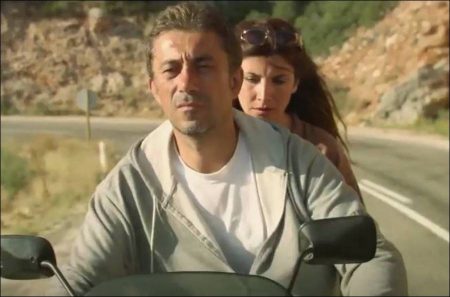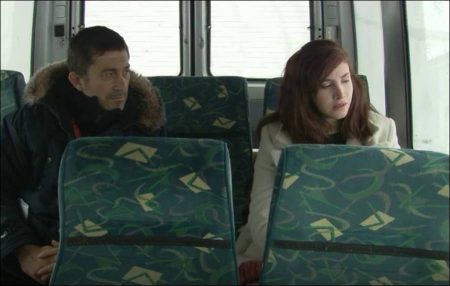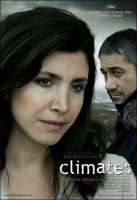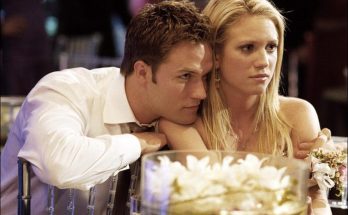Taglines: The spaces between people, even lovers, in images of deceptive simplicity.
Climates movie storyline. In Turkey, the middle-age University Professor Isa and his younger wife Bahar, who works in television, are spending summer vacation in Kas. a resort in Mediterranean Sea. After a couple of days, Isa decides to separate from Bahar since they do not communicate with each other. Bahar returns to Istanbul alone and then she travels to the countryside to work in a new project. Meanwhile Isa meets his former lover Serap with his friend Guven and later he rapes her in her house. Then he travels to meet Bahar and propose her to move in together again. What will be her decision?
Climates (Turkish: İklimler) is a 2006 Turkish drama film directed by Nuri Bilge Ceylan. The film charts the deteriorating relationship between a professional Istanbul couple, İsa and Bahar, played by Ceylan and his wife Ebru Ceylan. It was Ceylan’s first film shot on High-definition video.
The film features long takes of head shots, and poetic landscapes. The dialogue has long silences during which casual sounds are highlighted, such as the sound of a woman drawing on a cigarette.
The film was nominated for the Golden Palm at the 2006 Cannes Film Festival, and won the FIPRESCI Award there. Critic Michael Phillips named Climates the best film of 2006 and, later, the third greatest movie of the decade.
About the Story
The film starts on a summer holiday in Kaş, where the couple are barely talking. İsa is taking pictures of ancient monuments for a perpetually unfinished thesis for the university class he teaches; Bahar watches. At the beach she falls asleep and dreams that he is smothering her in sand. After rehearsing his speech while Bahar is swimming, Isa tells her that he wants to break up. While riding back to the city on a motorbike she suddenly covers his eyes with her hands, which causes the bike to crash, although both of them avoid serious injury. The couple go their separate ways and Bahar tells him not to call.
As fall follows summer, back in Istanbul, İsa makes contact again with a woman, Serap, with whom he cheated on Bahar before and who is in a relationship with an acquaintance of his. Winter arrives and İsa dreams of a holiday in the sun, but instead flies to Ağrı, the snowy eastern province of Turkey, where Bahar is working as an art director filming a TV series on location. He tries to win her back, but she rejects his advances. Later, she comes to his hotel room and stays overnight, but in the morning he flies off alone.
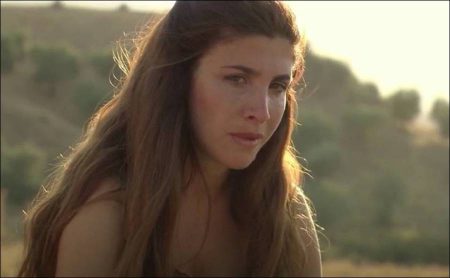
Film Review for Climates
Some killers do their work in a frenzy of violence. Others wield the knife quietly: they carve out your heart without spilling a drop of blood. In “Climates,” a man and woman break up with hot tears and lacerating words; there isn’t a knife in sight and their hands look immaculate. There are early signs of trouble between them, but it isn’t until one night, when their anger escapes like poison gas, polluting the air and making them reckless, that the violence of their feeling emerges. In his voice you hear an old, familiar impatience: he talks to her as if she were a child. And when she laughs at him, you hear the bitterness.
“Climates” is the story of a man and a woman, one of whom murders the other’s love. It was written and directed by Nuri Bilge Ceylan, a Turkish filmmaker who, with four features, has become an internationally recognized name. (His third feature, “Distant,” won the grand, or second-highest, prize at the 2003 Cannes Film Festival and had a limited release in America.)
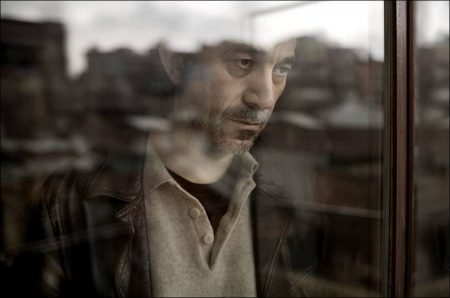
His interest in how we isolate ourselves from one another seems as simple as his visual style, which encourages contemplation rather than distraction. He holds his shots longer than most contemporary filmmakers, inviting you to rummage around images in which a change in focus and a darkly brooding sky mirror the discreetly shifting emotions creeping around their edges.
Mr. Ceylan is, as it also happens, a fine actor. He plays the lead in “Climates,” Isa, a professor who, when the film opens, is on a road trip with his younger girlfriend, Bahar (Ebru Ceylan, the director’s wife). The unhurried opening, which takes place amid ancient ruins, sets the pace and fixes the current climate: under the hot sun, Bahar watches as her lover distractedly walks around crumbled columns taking photographs and briefly stumbles (he smiles at his misstep), while remaining apparently oblivious to the tears that begin streaking her face. It’s on this same trip that they drink too much wine at dinner and that, one afternoon, she covers his eyes with her hands while he’s driving their scooter, causing an accident.
Isa and Bahar walk away from the accident intact though not unscathed. She returns home to Istanbul alone. Much of the rest of the film follows Isa, who, over the course of the ensuing fall and winter, emerges as a man of great surface charm. He teaches, plays tennis, politely rebuffs friends and, during one bravura scene, engages in a bout of raucous sex across a hardwood floor with another lover, Serap (Nazan Kesal). This blast of heat is so surprising (and funny) that it would be easy to overlook the intricate choreography involving the bodies and the camera, and how the nut that Isa playfully throws at Serap, and that hits the floor just before they do, finds a visual echo in one of her dropped earrings.
Like “Distant,” this film paints a haunting portrait of existential solitude, one in which the images speak louder and often more forcefully than do any of the words. Mr. Ceylan doesn’t write speeches or flatter the audience by offering us more information than he gives his character. His scenes play out to the natural rhythms of life, their meaning often articulated in silences, digressions and awkward laughter, as when Isa visits his mother, who repairs the pants he tore during his rollicking session with Serap, and then, with touching obliviousness, asks when he plans to settle down. Even when the dialogue sounds sharper, more obviously pointed, as in a casually sexist conversation between Isa and his office mate, its thematic importance tends to sneak in after the fact.
Although the film’s provenance and the calamitous distribution climate for foreign-language cinema in America mean that it’s destined for eye-blink runs at a handful of art-house theaters, “Climates” isn’t difficult or obscure. Its metaphors are transparent, its narrative structure uncomplicated. It’s a satisfyingly adult film about men and women and relationships that might seduce audiences more easily if it were French, though in that case it would probably be three times as chatty.
Mr. Ceylan has clearly been influenced by any number of modernist auteurs, including Michelangelo Antonioni. But while his films are similarly personal, they’re more accessible; h isn’t adding anything new to the language, he’s just extremely fluent. The mysteries of his work are those of the heart, the head, the soul.
Climates (2006)
Directed by: Nuri Bilge Ceylan
Starring: Ebru Ceylan, Nuri Bilge Ceylan, Nazan Kırılmış, Nazan Kesal, Mehmet Eryılmaz, Arif Aşçı, Can Ozbatur, Ufuk Bayraktar, Fatma Ceylan, Emin Ceylan, Semra Yılmaz, Ceren Olcay, Apo Demirkubuz, Feridun Koç, Zafer Saka
Screenplay by: Nuri Bilge Ceylan
Production Design by: Valérie Farthouat
Cinematography by: Gökhan Tiryaki
Film Editing by: Nuri Bilge Ceylan, Ayhan Ergürsel
MPAA Rating: None.
Distributed by: Pyramide
Release Date: May 3, 2006
Views: 385
